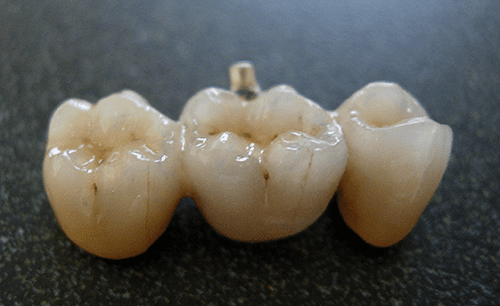A dental crown is a cap that is used to restore a tooth. It can improve a tooth’s aesthetics including its shape, size, and color.
Moreover, it’s said to also strengthen a tooth by improving the manner in which you bite. Dental crowns are similar to the shape of a tooth which is why they encase the entire tooth when they are cemented into place.
A bridge involves filling the gap in between teeth. Missing teeth can cause several issues including a bad bite pattern and a poor smile. In some cases, it can also lead to severe gum diseases and even TMJ disorder.

Both dental crowns and bridges are a common practice, however, you need to be well aware of the applications of each to be able to make a decision between the two.
Here are four questions you need to ask before getting a crown or bridge:
Who Should Get Dental Crown or Bridge?
If you happen to have cracked, crooked, uneven or weak teeth, then a dental crown is the right choice for you. It’s also an effective procedure when you’re experiencing tooth decay and toothaches.
When it comes to having large gaps between the teeth, a person fits in as a candidate to have a bridge. However, ensure that you’re not suffering from weak bones because when you get the bridge implanted, your jaw bones should be healthy enough to support the volume of the device.
When you have gaps between teeth or are losing teeth, then it might be possible that you’re undergoing a bone degeneration process. Under such circumstances, you need to consult a dentist to get X-rays of your jaw structure and ensure that you’re a good fit for the procedure.
How Do You Choose a Dentist For a Dental Crown or Bridge?
Choosing a qualified dentist for a dental crown or bridge is an essential task. The procedure is common and routine, however, make sure that your dentist practices international standards of treatment and care.
For example, medical certification is proof of your dentist being qualified for the job and you can also inquire about their educational history just to be sure.
How Long Will They Last?
Both dental crowns and bridges will last a good long while, though how long depends on a few factors.
Good oral health requires you to brush and floss on a regular basis because oral hygiene should be your number one priority if you want the procedures to last and be effective in the long run.
You also need to avoid eating unhealthy foods that have a hard surface because it might damage the crown or bridge. Avoid sticky foods to prevent decay and your crown or bridge should last from five to fifteen years.
Which One is Right For You – a Dental Crown or Bridge?
As noted above, crowns and bridges serve different purposes.
If you have a deteriorating tooth, a crown might be the better option. However, if you’ve have missing teeth, a bridge is the better decision.
Ultimately, though, the wise choice is to seek the recommendation of your dentist regarding what procedure best fits your needs. Visit us at Kirkland Family Dentistry so we can help you make this decision.


I have a bridge that is very loose my dentist says she didn’t know I was a tongue thruster she did know I grind my teeth and told me to get night gaurd.. should she have warned me about the bridge becoming loose due to tongue thrusting before she put the bridge in…now she said I have to get all on 4 which is very expensive or renove the bridge and get a partial. I dont want to have to remove my teeth for a partial..I dont know what to do
My wife had an old, twenty years, 5 tooth bridge, center, upper section, which fell out one evening. We are now living in another state and using a local dentist here. We rushed to our dentist the next morning and he immediately began treatment. Codes used were D 6750, 6240, 6240, 6240, 7140, 7140 and 6750. Our cost was $6600.00 (Ouch) The welfare retiree plan that I belong to used analternate method of a parftial denture instead of a crown. They reimbursed us for only $600. They indicated a crown was not needed. The information I have reviewed notes that you should rely on your dentist and his first hand clinical examination and knowledge of the patient’s medical history.